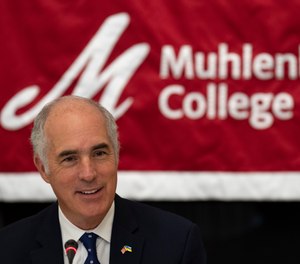
Bob Casey, D- Pa., helped secure the grant to increase Inside/Out’s efforts to reduce recidivism and increase employment opportunities
By Jenny Roberts
The Morning Call
ALLENTOWN, Pa. - When Rachel Liberty first entered a prison four years ago, her worldview was “fundamentally changed.”
Liberty, a Muhlenberg College graduate, participated in the college’s Inside/Out Exchange Program in 2018 at Graterford State Prison in Montgomery County. There, she and other Muhlenberg students had class with incarcerated men who were serving life sentences.
Liberty remembers coming to class her first day filled with anxiety and later leaving inspired by her classmates.
“These are some of the nicest people I’ve ever met; moreover, some of the most brilliant,” she said. “These individuals, who experience fatal flaws in the system that’s supposed to bring justice, are the ones with the solutions to fix it.”
Liberty shared how her Inside/Out experience shaped her perception of mass incarceration at a roundtable discussion Monday with U.S. Sen. Bob Casey at Muhlenberg College. Casey, D- Pa., helped secure $231,000 in grant money for Muhlenberg to increase Inside/Out’s efforts to reduce recidivism and increase employment opportunities for incarcerated people in the Lehigh Valley.
“I grew up in a generation where we thought of incarceration as mostly punitive,” Casey said. “And I think what a lot of us have begun to realize is we have to take the rehabilitation part of serving time a lot more seriously.”
The United States has the highest incarceration rate in the world. In Pennsylvania, there are 659 people incarcerated in jails and prisons for every 100,000 people in the state, according to 2021 data from the Prison Policy Initiative, a higher rate than in countries such as the United Kingdom and Canada
“I believe mass incarceration is a public health crisis,” said Kate Richmond, program coordinator for Inside/Out and a Muhlenberg psychology professor, noting the prison system most affects people of color and people with a mental illness.
With the help of federal funds, incarcerated people in Lehigh Valley corrections facilities will now be able to earn a college credit through Muhlenberg College’s Inside/Out program for the first time.
Muhlenberg staff hopes that sets incarcerated students up to continue pursuing higher education once they are released, and in turn reduces the chance they will be incarcerated again.
“Up until this point we have not been able to award credit to the students who are incarcerated, and in my opinion that has been a deeply problematic part of our program,” Richmond said. “Having a college credit opens up a tremendous amount of opportunities.”
Kristi Belotto, who spoke at the roundtable discussion, was part of the Inside/Out program in 2019 when she was incarcerated at Lehigh County Community Corrections Center.
Belotto said her experience with incarceration has impacted how she does her job now as a family-based counselor.
“It has definitely made me more humble than I was before my experience,” she said. “It really helped me see my clients where they’re at, instead of already coming in with [ideas about] why they were recommended for the type of treatment that I do.”
Belotto said she still keeps in touch with one of the Muhlenberg students she became friends with through the program.
Muhlenberg will also put funding toward its think tank to train graduates of the program on how to facilitate community discussions about criminal justice issues. Money will also go toward a research team to measure the effectiveness of the college’s Inside/Out program.
“We’re interested in the ways that the liberal arts encourage critical thinking, open mindedness and dialogue across difference,” said Jess Denke, instructor and program coordinator for Inside/Out.
The first iteration of Inside/Out classes began in the late 1990s at Temple University in Philadelphia. The program has since spread, with more than 200 partnerships globally between colleges and correctional departments.
Part of Muhlenberg’s grant money will go toward helping faculty from other local universities, such as Lehigh University and Lafayette College, create their own versions of Inside/Out.
At Muhlenberg, the program brings together 15 college students and 15 incarcerated students for a semester-long class to discuss their life experiences and to explore five topics related to the prison system: racism, mental health, globalization, mass media and the school-to-prison pipeline. Students then work on a research project as part of the course to identify a problem related to one of these topics in the Lehigh Valley and propose a way to address it.
The power of the Inside/Out program lies in bringing together a group of people who may not have otherwise met to bond through conversation, participants said.
By hearing about the personal stories of their classmates, participants are able to brainstorm ways to fix the criminal justice and prison systems, and with the help of Muhlenberg’s think tank, take action at the local level.
“We all want to be connected to good jobs; we all want to be connected to our family; and we all believe truly that we can do better,” Richmond said. “And once we establish relationships with each other, we’re able to tackle the hard questions.”
McClatchy-Tribune News Service
Copyright © 2025 CorrectionsOneGrants.com. All rights reserved.
